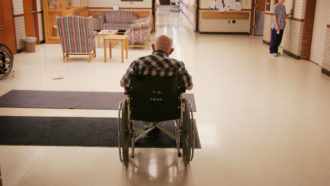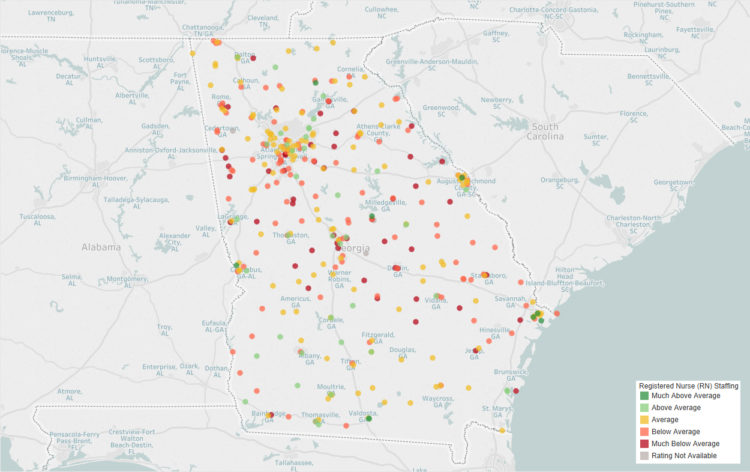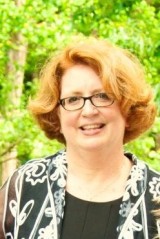An analysis of Medicare data shows that nearly half of Georgia nursing homes recently were found “below average’’ or “much below average’’ in their staffing levels of registered nurses.
RNs are the highest-trained caregivers required to be on staff in a nursing home, and they supervise other nurses and aides. Medicare mandates that every facility have a registered nurse working at least eight hours every day, Kaiser Health News reported this month.

Of Georgia’s 346 nursing homes that were rated, 163, or 47 percent, received “much below average” or “below average” ratings of RN staffing based on Medicare data from January through March of this year, as reported by KHN.
Medicare rates RN staffing based on the average number of hours worked by registered nurses and nurse administrators for each resident. The ratings range from “much below average” to “much above average.”
Medicare recently began collecting and publishing payroll data on the staffing of nursing homes as required by the Affordable Care Act, rather than relying as it had before on the facilities’ own unverified reports, Kaiser Health News reported. Payroll records revealed lower overall staffing levels than facilities had indicated, especially among RNs, KHN reported earlier this month.
Melanie McNeil, Georgia’s long-term-care ombudsman, told GHN on Monday that she wasn’t surprised by the staffing findings.
“Not enough staff is a common concern that ombudsman representatives hear from residents, family and sometimes even staff,’’ she said.
“RN staffing is important because direct-care workers may notice changes in a resident but they don’t have the training that RNs do to recognize what the change means and what action to take,’’ McNeil said.

“For years, advocates have been urging specific staffing ratios for direct care workers and nurses, including an RN 24 hours a day,’’ she added. “As a state, we should provide more incentives for individuals to enter these professions, including better wages and tuition forgiveness.”
Kaiser Health News also reported Monday that Medicare lowered its “star’’ ratings for nearly 1,400 nursing homes nationally because they either had inadequate numbers of RNs or failed to provide data proving sufficient nurse staffing.
Of the facilities downgraded to 1 star, 27 were in Georgia, but KHN said it’s not immediately apparent whether they were downgraded because of RN levels, or because of the other possible reasons — that they didn’t submit data or that the government couldn’t verify their data.
Earlier this year, nursing home care emerged as an explosive issue in the state. An 11Alive Investigation (by Atlanta’s WXIA) uncovered the 2015 death of 93-year-old Rebecca Zeni, a northwest Georgia nursing home resident killed by scabies infestation.
On June 4, 2015, a report by the Georgia Department of Public Health revealed that Zeni was one of 35 residents and staff infected with scabies in the Shepherd Hills Nursing Home in LaFayette. Last month, state lawmakers and top health officials held a special meeting in response to the scabies report.
The Georgia Health Care Association, a nursing home industry trade group, said in a statement Monday to GHN that the Medicare staffing methodology is flawed and misleading, adding that it makes things look worse than they are.

“The current methodology underreports staffing,’’ said Devon Barill, an association spokeswoman. “For example, for employees who are salaried and work more than 40 hours in a week, [Medicare] does not count hours beyond 40 per week unless the salaried employee is paid an additional amount above their usual salary, even when it is widely known that many nurses work extra shifts and thus extra time.’’
She added that Georgia nursing homes face a statewide shortage of RNs, so they keep higher levels of licensed practical nurses (LPNs) on staff. But the federal Centers for Medicare & Medicaid Services (CMS) does not count some of those LPN hours worked, such as supervisory hours, Barill said.
“Collectively, this results in fewer hours of patient care being reported today than actually delivered and certainly less than previously reported. As such, we don’t feel that the new ratings provide an accurate reflection of the care being provided in Georgia’s centers.”
“We also believe that judging the quality of a nursing home based solely on staffing is misguided,’’ Barill added. “There are centers with high staffing levels and poor outcomes and numerous deficiencies and there are centers with low staffing with good inspection reports and good quality outcomes.”
Nearly 1.4 million people are cared for in skilled nursing facilities in the United States. When nursing homes are short-staffed, nurses and aides scramble to deliver meals, transport bedbound residents to bathrooms and answer calls for pain medication, KHN reported. Essential tasks such as repositioning a patient to avert bedsores can be overlooked when workers are overburdened, sometimes leading to avoidable hospitalizations
“We’ve just begun to leverage this new information to strengthen transparency and enforcement with the goals of improved patient safety and health outcomes,” the CMS said in a statement to KHN.

Kathy Floyd of the Georgia Council on Aging said Monday that ‘’the lack of RNs has caused some homes to give more duties and responsibilities to LPNs. But you have to make sure they have the necessary training and, of course, that [instruction] takes time away from direct care.”
Overall staffing levels are low, Floyd added. “Advocates and providers are talking about possible solutions to Georgia’s lower staffing levels. I hope our next governor will look at provider reimbursement rates and please, please tie increases to quality measures.”
The new payroll data, analyzed by Kaiser Health News, showed that for-profit nursing homes averaged 16 percent fewer staff than did nonprofits, even after accounting for differences in the needs of residents. The biggest difference was in the number of registered nurses: At the average nonprofit, there was one RN for every 28 residents, but at the average for-profit, there was only one RN for every 43 residents.
The data also revealed that nursing homes have large fluctuations in staffing. The average nursing home had one licensed nurse caring for as few as 17 residents or as many as 33, depending on the day. On the best-staffed days, each certified nursing assistant or other aide cared for nine residents, but on the worst-staffed days, each aide was responsible for 16 residents, KHN reported.
Weekend staffing was particularly sparse. On weekends on average, there were 11 percent fewer nurses providing direct care and 8 percent fewer aides, according to the KHN report.
McNeil, the long-term care ombudsman, said that including the nurse staffing information in the nursing home ratings “is helpful for individuals to consider when choosing a nursing home.’’
The Georgia Health Care Association cited consumer satisfaction surveys conducted by NRC Health, in which the trade group said 93 percent of nursing center residents and their families indicated they would recommend Georgia skilled nursing care centers to friends or relatives in 2017.
“The cost of direct care staffing for Georgia’s skilled nursing centers still exceeds what Medicaid currently reimburses, so centers are unable to compete with the wages and benefits packages of other health care provider groups and non-health care employers,’’ Barill added. The Georgia Health Care Association, she said, “continues to work with legislators and other stakeholders to address these issues and develop methods to enhance the ability of Georgia’s nursing centers to recruit and retain a skilled, competent workforce.”
GHN intern Naomi Thomas contributed to this article.

